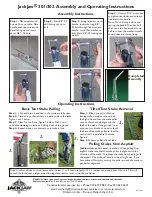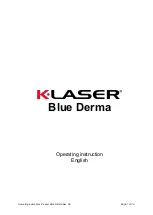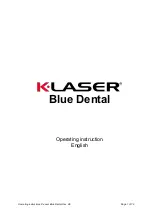
BALE RESTRAINT BEAM ADJUSTMENT AND
REMOVAL
To adjust the bale restraint beam remove the three M12
bolts located in the holes on both sides of the restraint
beam, and loosen the fourth bolt in the slot. Reposition
the bale restraint beam by aligning the necessary holes,
replace and tighten bolts.
To remove the bale restraint, take the weight of the
restraint using a suitable lifting device. Remove the 3
bolts from each end before extracting the bale restraint
beam itself.
Refitting is the reverse of above.
The position of the bale restraint has an important role
on how much of the bale is exposed to the crossbeater.
The closer the bale restraint is to the fan motor the more
straw will flow through the machine. If you have damp,
matted bales we suggest moving the bale restraint
towards the back of the machine and slowing the bed
speed down.
HYDRAULIC VALVE
Before attempting to dismantle any of the hydraulic
system, the deflector must be fully lowered to prevent
injury from the unexpected lowering of this component.
Oil contamination can result in failure of the hydraulic
circuit. An inline pressure filter will be required if oil
contamination is happening regularly.
If problems are experienced with either the hydraulic
system or electric controls, please contact Teagle
Machinery Ltd. for advice as a separate manual is
available to cover troubleshooting and repair.
LUBRICATION
Good quality semi-solid grease should be applied to the
following grease points:
The above frequencies are based on typical daily use for
bedding purposes. Continuous use for special
applications will necessitate more frequent lubrication.
ELECTRIC CONTROLS
Before maintaining any part of the electronic controls
and wires, disconnect the 12v supply. Failure to do so
may result in damage to the electronic circuit
controlling the bed chain speed.
It is recommended that the controls are repaired by the
manufacturer. Please contact Teagle Machinery when
repairs are required. Copies of the circuit diagram are
available from the manufacturer on request.
When the machine is not being used it is recommended
that the control desk is stored safely away from the
machine in a dry location.
Adjustment of the electric controls and bed speed can
be seen on page 20 & 21.
FAN MOTOR
The fan motor supports the entire fan assembly. Before
you attempt to remove the fan make sure the machine
is removed from the loader and placed on a level hard
surface in a dry, clean working environment. Follow the
procedure in removing the fan motor:
1. Remove hydraulic hoses to the top housing
including the end deflector ram and the swivel
chute motor.
2. Remove the bolts holding the top housing in place.
3. Carefully lift and remove the top housing SC6125.
4. Remove the bolt holding the fan onto the fan
motor. It maybe necessary to remove the bale
restraint beam SC6116 to aid access.
5. Remove the fan motor cover and loosen the nuts
holding the fan motor onto the fan.
6. Take the weight of the fan motor with a lifting aid.
Remove the fan motor nuts.
7. Pull the fan motor out of the fan hub (you may
need a fan removal tool SC3776).
8.
Please note the position of the motor keyway shaft
when placing it back into the fan hub.
To replace
the fan motor, follow the procedure above in
reverse and add thread lock to the fan bolt before
setting to a torque rating of 90N/m (67 ft lb) See
figure 6.
CROSSBEATER MOTOR
The crossbeater motor supports the crossbeater
assembly. Before you attempt to remove the motor
make sure the machine is removed from the loader and
placed on a level hard surface in a dry, clean working
environment. Follow the procedure in removing the
motor:
1. Remove hydraulic hoses to the crossbeater motor.
2. Loosen the six M12 nuts holding the crossbeater
mounting plate SC6114 onto the main body.
3. Take the weight of the crossbeater motor with a
lifting aid. Remove the six M12 nuts.
8
Figure 6. Fan assembly with motor
Greasing / Oil
See separate chart
(Inside front cover)
Bed Chain
Tension
After first day then twice
weekly depending on use
Clean above
inspection Panel
Monthly, depending on
use
Table 1. Service Schedule
Summary of Contents for 15056
Page 1: ..._ _ _ _ _ _ _ _ _ _ _ _ ...
Page 28: ......













































